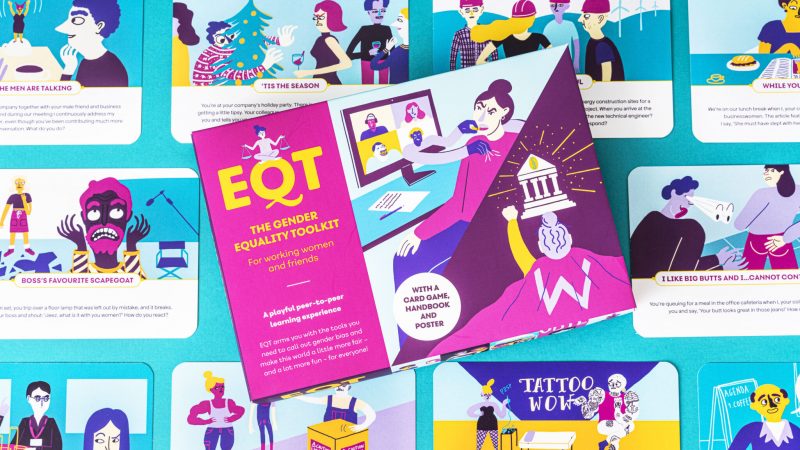Bernd Riedel
As the Head of Strategy and Design at Ellery Studio, Bernd Riedel played a key role in spearheading EQT. He also served as the creative director for The Infographic Energy Transition Coloring Book – another collaborative project by IKEM and Ellery – which was published in 2017.
Like the colouring book, which presents research on climate change using colourable infographics and illustrations, EQT challenged Ellery’s illustrators and animators to find ‘an endearing and comfortable and maybe even funny way to explore an issue that is absolutely not fun,’ Riedel said. ‘And the illustrations in this toolkit nail it – they convey the problematic situation in a way that actually makes you smile, without being corny or undermining the message. That is an absolute art.’
Riedel hopes that these formats inspire others to consider creative ways to explore complex topics. ‘Our goal is for other people to see the concept, understand it, and then start to be able to imagine similarly creative approaches to other issues as well. Like, “If they can make a role-playing game about gender equality, and if they can make a colouring book about the energy transition, then we can make a theatre play about diversity.”’
EQT’s playful, disarming approach to a serious topic can lead audiences to see problems in a new light – one of the most important steps in identifying effective solutions.
Louise Camier
When Louise Camier joined the Sustainability & Innovation Department as a working student in fall 2018, she immediately dove into the gender equality research that would become the basis for EQT.
‘I’ve always been interested in this topic, and I loved researching it for this project,’ she said.
Camier supplied much of the content for the toolkit’s infographic poster, ‘Women making waves: a brief history of female empowerment,’ which chronicles key advancements in women’s rights. She was surprised by much of what she learned from the research – such as the persistence of the gender pay gap despite laws prohibiting gender-based wage discrimination – and was taken aback by how recent much of the progress on women’s rights has been.
‘I was shocked that so many of the opportunities that we take for granted today actually only opened up relatively recently,’ she said. ‘Hopefully, in a few years, we’ll be able to look back at all of the inequalities that exist today and marvel at how far women’s rights have come since our current era.’
Camier believes that EQT can play a unique role in cultivating a gender-equal workplace environment because its playful format encourages people to overcome their reluctance to exchange ideas on these topics. Conversations like these can be particularly powerful if they take place at work, she noted. ‘I’d really like for people to take this toolkit to their employers or supervisors so that they can have a gender equality workshop, play the card game together, and really engage with the content.’
This is how lasting social change occurs, she said – individual by individual, workplace by workplace. ‘I think the toolkit has the potential to be part of a grassroots effort to improve lives, at work and beyond. I’m so excited to see it in action!’
Follow the IKEM and EQT Instagram accounts for more on the toolkit, including short video interviews of Louise and Bernd. To find out more about our crowdfunding campaign to finance toolkit production, please visit our Kickstarter page.





